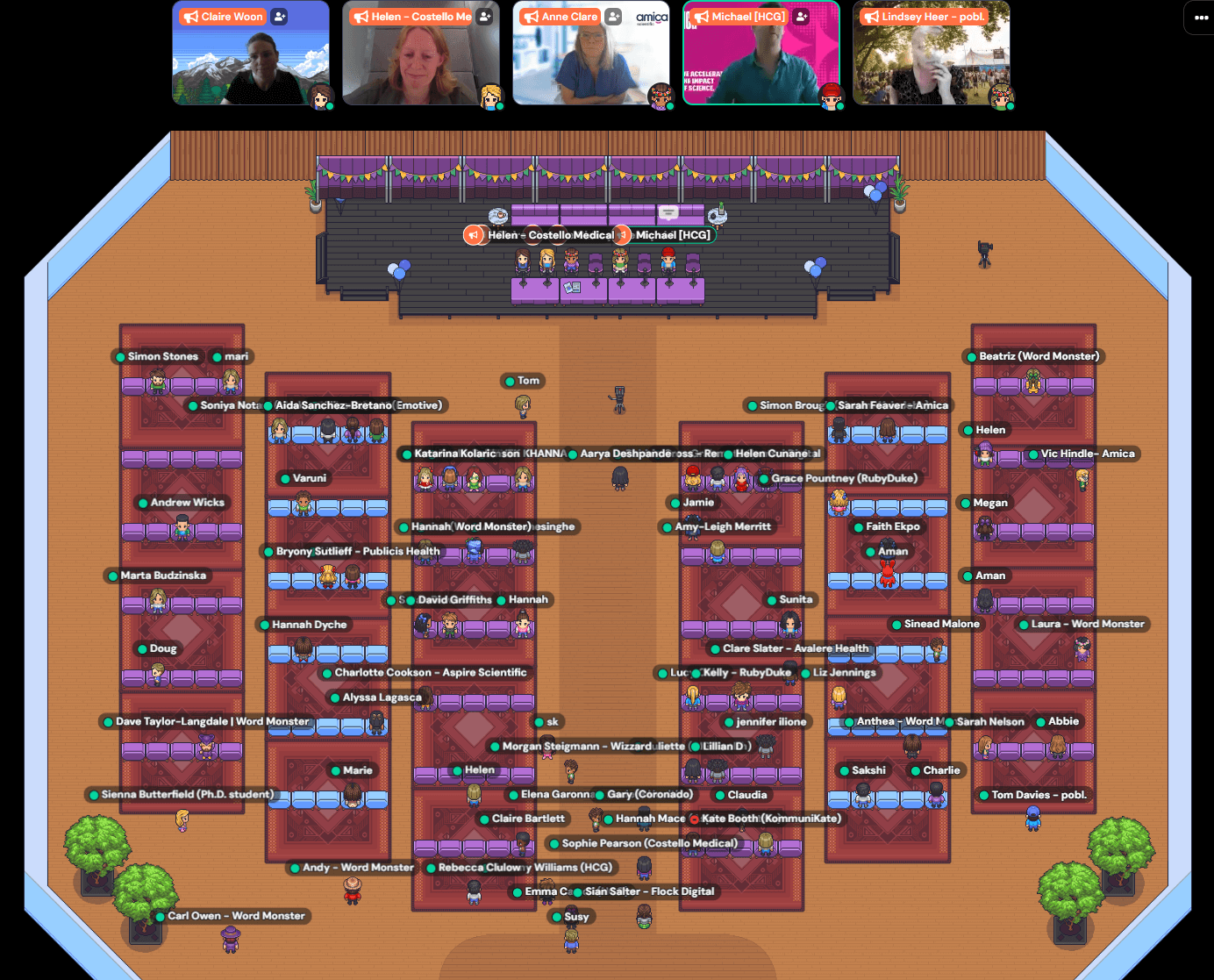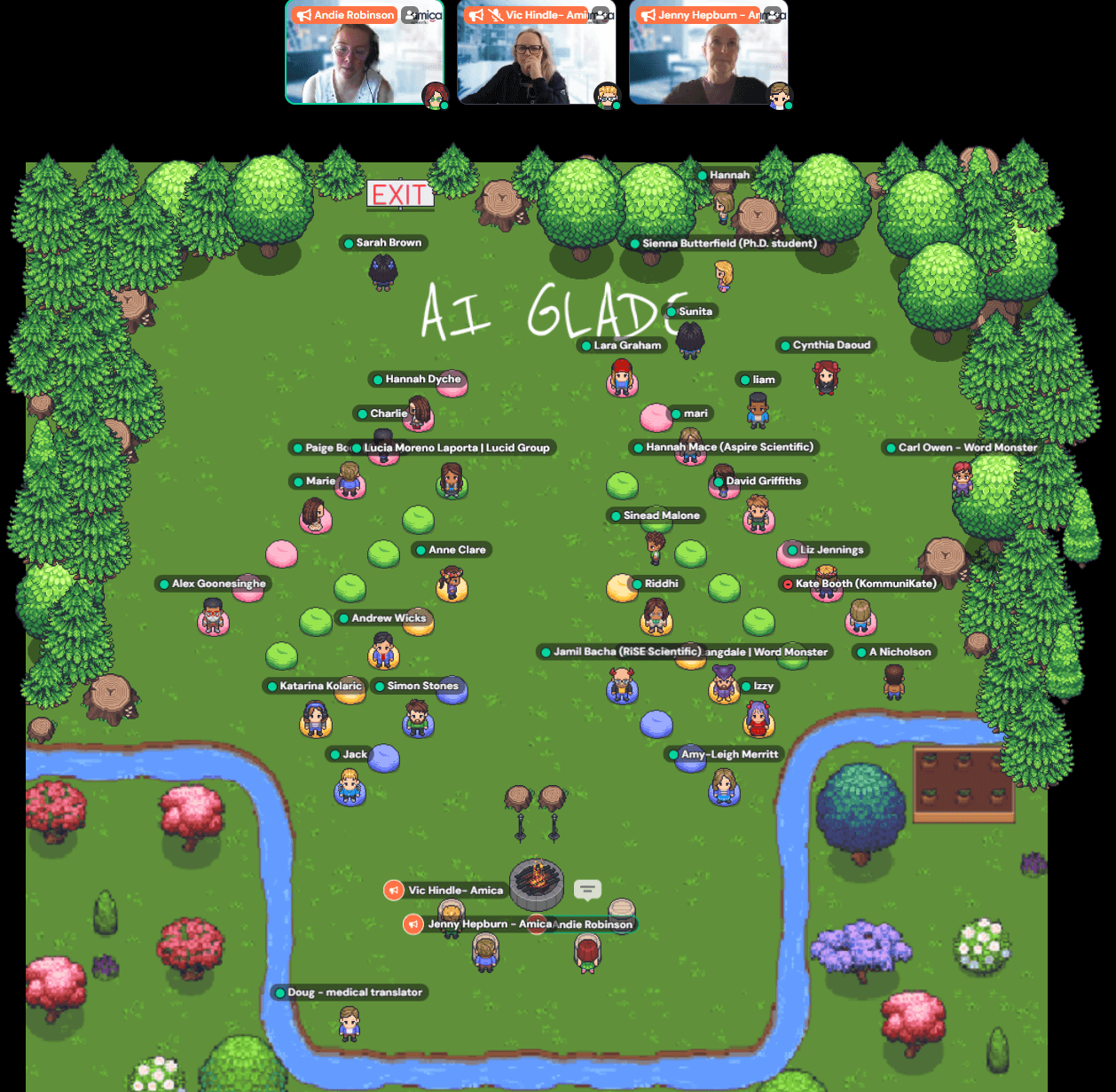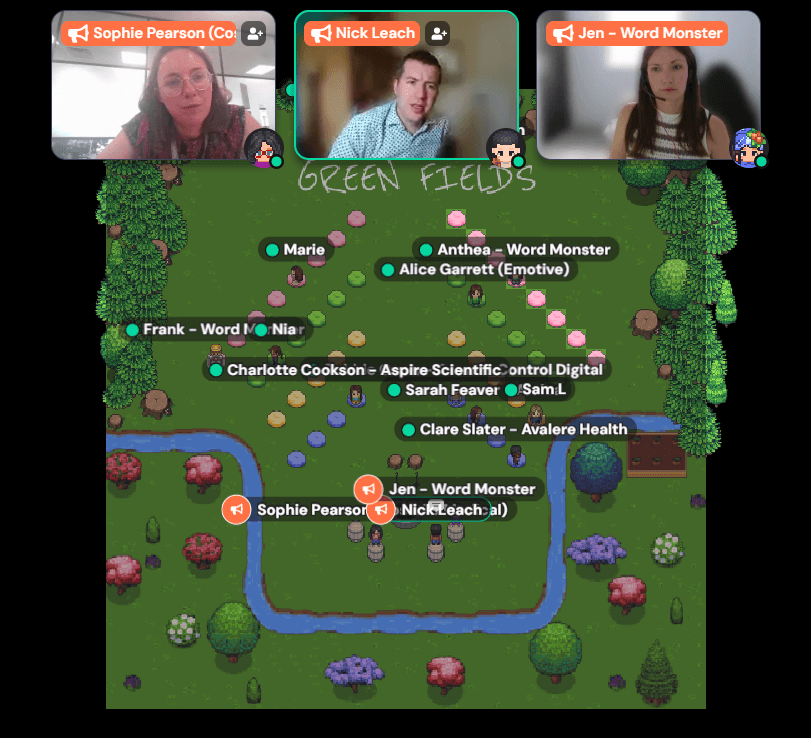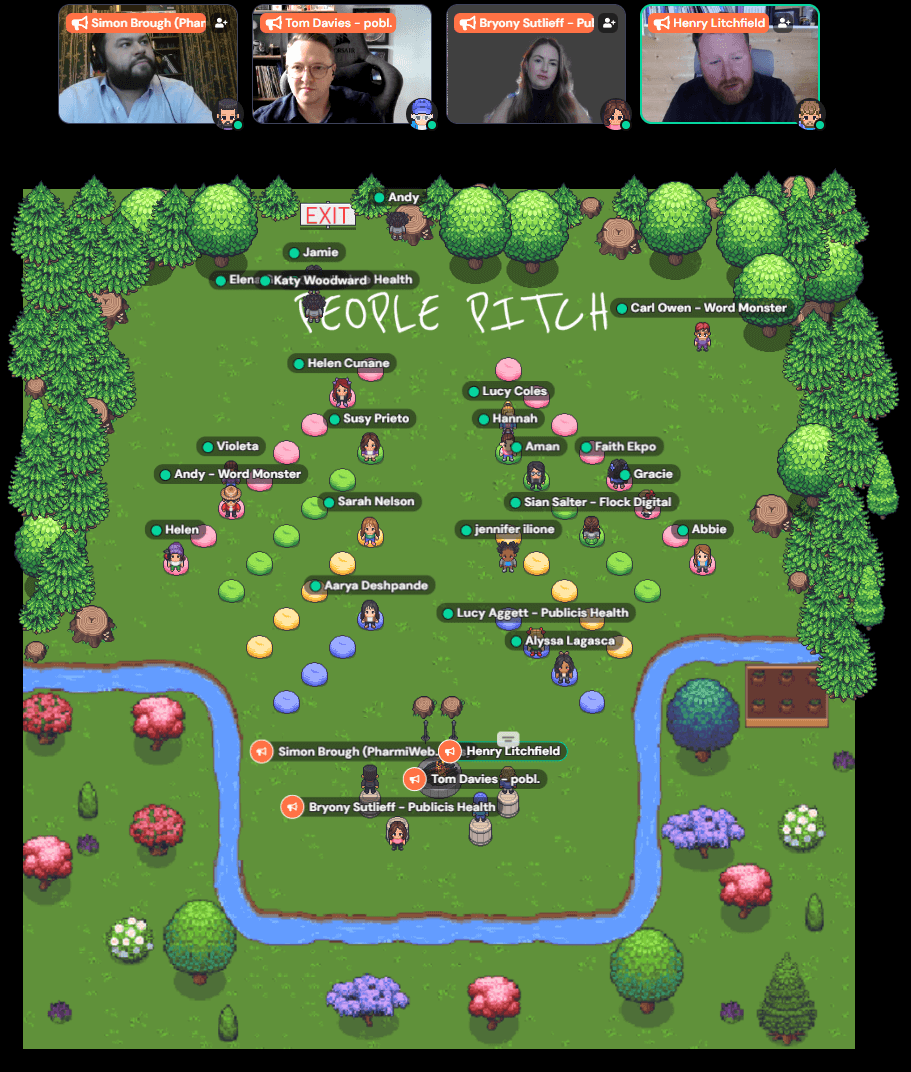A main stage packed with talent. Cosy campfire chats. Even a rooftop bar for mingling. Sounds like a summer festival, right? Wellies on for the mud, bracing your tent against the wind?
Well, we’re actually talking about our A Festival of #MedComms event that took place on this year’s MedComms Day. A festival with a difference, hosted in our innovative virtual, gamified platform. We gave our 100 delegates a unique experience that was as close to a live festival as you could get… without ever leaving your desk.
It was an incredible chance to:
- Celebrate our brilliant industry (and everyone in it)
- Share real, useful insights, to inspire, engage and upskill
- Showcase the latest trends shaping the future of MedComms
- Bring the community together – agencies, in-house teams, freelancers, the lot
- Give agencies a platform to shine, share ideas and meet top talent
Expert panel discussion: The evolving client landscape

So what’s the first thing to do, joining a virtual event for the first time? Well, explore of course. Our beautiful congress room was decorated to the max, all sponsor booths decked out in festival regalia, with clear control instructions and room labels. Attendees could run around the space, check out all the rooms, start networking at the booths and gear up for the roundtable.
The roundtable discussion covered the evolving landscape of pharma communications and strategy, featuring leaders across the MedComms industry.
The consensus? The lines between medical and commercial functions are blurring, driven by the shared goal of putting the customer at the heart of communications:
- The separation between medical and commercial was clear 15–20 years ago, but these boundaries are now being blurred as the functions become more customer-centric
- We are well-equipped to deal with these changes – the MedComms industry is brilliant at pivoting and changing and getting ready for the next new normal
Showing the value of work is paramount:
- Budget implications are a key driving force in the changes seen in the industry, with an ever-increasing focus on getting measurable value from deliverables
- Both internal pressures (budget) and external pressures (distrust, social/political forces) are driving the need to demonstrate the value of our work
- This is a key area where agency partners can play an important role in supporting pharma clients – we are used to selling in ideas and working towards key performance indicators
- A valuable agency partner will demonstrate the value of their work to the client, so the client can demonstrate their value to internal stakeholders
Analytics will help to demonstrate the value of work:
- Metrics like attendance and engagement are useful, but only tell a small part of the story
- The important question is how we can demonstrate behaviour change
- We have access to more real-time data than ever before, so it’s important to continually evaluate data to inform conversations with clients and ultimately shape decisions
Patient involvement is becoming ever-more important in MedComms:
- There is a strategic shift towards giving patients a seat at the table and involving them in a decision-making capacity
- This is the right thing to do from an ethical perspective, but it also has commercial benefits, with assessments from NICE, the FDA and other bodies seeking patient perspectives
- The key challenge is how to effectively integrate patient perspectives into medical strategy
Agencies will need to become more agile to work alongside pharma partners:
- In previous years, strategic publication plans were set at the start of the year, with adjustments throughout the year
- However, a recent shift is to handle more changes and to become more reactive
Agencies are adapting to client requests around the use of AI:
- The technology is not at the stage to discuss reducing budgets due to the use of AI, although this is expected by some clients
- It is important to be using AI every day, and to be familiar with the opportunities and weaknesses, to be able to use it in client work
- There is a lot of poor-quality content available, and pharma needs support from agencies to help rebuild trust with healthcare professionals and patients in light of this
- AI has been a helpful tool in background research or completing repetitive tasks to a high level of accuracy
- The big shift is in clients providing access to their own internal AI systems, allowing access to client data in a secure environment – this puts the agency in the role of data translator
Artificial intelligence: Beyond the hype

As AI tools become more integrated into daily workflows, building confidence and competence in their use is essential. This session discussed how individuals and teams can get started with AI.
Build confidence:
- Try it, for both commercial and personal use
- Make Custom GPTs for small things, even recipes and exercise, just to encourage experience (Andie from Amica suggested having competitions internally to build one each)
- Start with non-commercial/client projects to limit confidentiality issues
- A team account and licences for the business can have extra security protection, opening more doors for use
- Once people are using AI day-to-day, more ideas come for how to create efficiencies
Tips for staying up to date:
- Keep reading and listening to key people you find valuable
- Keep trialling things
- Keep focused on what’s important for you (try not to get distracted by the noise)
Navigating challenges with AI:
- Prompts should be specific and high-quality, to get the most out of the responses and to reduce hallucinations
- Make sure you always know the content before presenting it to a client, so you’re not just presenting AI regurgitation
Getting ready for the future with AI:
- Those that adopt AI early will see more success
- We need to be using AI daily
- AI won’t replace us, but it will affect those who don’t know how to use it at all
Sustainability in MedComms

Pharma clients are increasingly holding their agency partners to high environmental standards. From B Corp to environmental, social and governance (ESG) forms, there are many ways to track and achieve sustainable practices and each agency can find the processes that work for their company.
Pharma clients are increasingly asking agencies to demonstrate environmental credentials:
- These include ESG forms or carbon measurements
- There are many different ways to improve environmental scores as an agency; sharing weekly eco-friendly tips internally or measuring electricity tariffs can support remote agencies to measure and improve their score
- Travel is a key measure, so tracking all journeys and calculating the carbon is important for agency employees
- Supplier emissions can be a large source of emissions, but hard to track
- Don’t underestimate the amount of time it will take to gather data to support the environmental scores
Day-to-day changes can make a big difference to sustainability:
- An annual impact report allows agencies to be transparent about improvements in sustainability, these are a useful tool to allow you to reflect on progress
- Thinking local for suppliers and volunteering opportunities can be a quick win
- Developing an environmental policy helps to show what you are doing for the environment
- Using sustainable modes of transport is key, this can be seen with pharma moving away from long-haul flights for quick meetings
Talent and resourcing in uncertain times

The pharmaceutical industry is facing a perfect storm of challenges, that are shaping how pharma companies – and their agency partners – operate. Understanding these challenges will be key to managing volatility and continuing to develop talent through these uncertain times.
Contextual challenges facing the industry:
- The pharmaceutical industry, particularly in the UK, has been navigating a series of compounding pressures for the past 3 years
- These pressures include post-Brexit market instability, global disruptions from the COVID-19 pandemic, increasing public distrust, driven in part by misinformation, especially from the US, speculation around government legislation on pharma profits, creating uncertainty for pricing and business models
These challenges are trickling down to agency partners in several ways:
- Clients are becoming more conservative with hiring and spending and are looking in-house for solutions
- Agencies are likewise taking a cautious approach to internal resourcing, aiming to avoid redundancies while still managing workloads
- A broader sense of economic sensitivity is influencing project timelines and budget negotiations
How is AI impacting learning and development?
- There is a change in the skills landscape, and new hires need to show that they are capable of strategic thinking
- Companies need to invest in AI technologies, especially when it comes to learning and development, as if you don’t have the right tools, there is no point doing the training
- Large pharma companies may have their own AI models that agencies can leverage, but small-to-medium size pharma companies will be looking at agencies to provide their own AI models
- The focus on learning and development needs to be around human skills that compliment AI, as people don’t want to talk to robots
Training opportunities in MedComms:
- There are few opportunities in the market as we are investing in tools that make us faster and are more detailed, therefore teams are likely to shrink
- The work that we are doing is much more of the thinking
- Training needs to reflect this, we need to get accustomed to managing machines not people
The risk of not hiring junior people:
- Lose fresh ideas and fresh ways of thinking
- Where do the leaders of the future come from?
- Also people need to ‘do the do’ so they can know what a good material actually looks like. E.g. they need to have had practice writing manuscripts to understand what a good manuscript looks like
It’s not all doom and gloom:
- We work in healthcare and therefore we need ‘people people’
- We need human skills to build relationships, which you can’t fully automate
- With recruitment AI strips humanity from the process
- AI should improve the process, not replace existing processes
What does the future hold:
- There is still a lack of confidence and volatility in the market, so agencies are still not hiring new people
- There will be an increasing demand for freelancers as that gives agencies more flexibility and they aren’t carrying the costs of hiring
Final thoughts
As the pharma and MedComms landscape continues to evolve, agencies must remain agile, strategic and human-centered (whether that is our client or the end patient). From navigating economic pressures and embracing AI, to championing sustainability and nurturing future talent, the future holds opportunity for those who know how to adapt.
We’d like to thank our partners at pobl. and all the speakers for their insightful contributions to the day. This was a hugely informative event and one that will help to set our sights and make the most of the opportunities in the coming next year. See you next MedComms Day!
